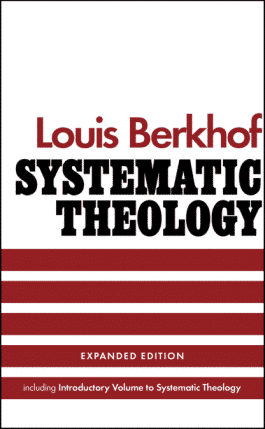save
$5.50Systematic Theology (Louis Berkhof)
$39.50$45.00
Professor Berkhof died in 1957, at the age of 83. He was an outstanding American teacher and the author of some 22 books. After two pastorates, he began his long career as professor at Calvin Seminary, Grand Rapids, in 1906. Here he remained for 38 years, devoting his talents and immense stores of knowledge to the training of men for the ministry. His ‘Systematic Theology’ was his magnum opus, being revised and enlarged during his lifetime until it reached its present final form.
Berkhof’s loyalty to the well-defined lines of the Reformed Faith, his concise and compact style and his up-to-date treatment have made this work the most important twentieth century compendium of Reformed Theology. ‘The work seemed particularly important to me’, writes the author, ‘in view of the widespread doctrinal indifference of the present day, of the resulting superficiality and confusion in the minds of many professing Christians, of the insidious errors that are zealously propagated even from the pulpits, and of the alarming increase of all kinds of sects. If there ever was a time when the Church ought to guard her precious heritage, the deposit of the truth that was entrusted to her acre, that time is now’.
Only 1 left in stock
Systematic Theology
Berkhof’s loyalty to the well-defined lines of the Reformed Faith, his concise and compact style and his up-to-date treatment have made this work the most important twentieth century compendium of Reformed Theology. ‘The work seemed particularly important to me’, writes the author, ‘in view of the widespread doctrinal indifference of the present day, of the resulting superficiality and confusion in the minds of many professing Christians, of the insidious errors that are zealously propagated even from the pulpits, and of the alarming increase of all kinds of sects. If there ever was a time when the Church ought to guard her precious heritage, the deposit of the truth that was entrusted to her acre, that time is now’.
Table of Contents
| Part One – THE DOCTRINE OF GOD | ||
| The Being of God | ||
| I. | The Existence of God: | 19 |
| II. | The Knowability of God: | 29 |
| III. | Relation of the Being and Attributes of God: | 41 |
| IV. | The Names of God: | 47 |
| V. | The Attributes of God in General: | 52 |
| VI. | The Incommunicable Attributes: | 57 |
| VII. | The Communicable Attributes: | 64 |
| VIII. | The Holy Trinity: | 82 |
The Works of God |
||
| I. | The Divine Decrees in General: | 100 |
| II. | Predestination: | 109 |
| III. | Creation in General: | 126 |
| IV. | Creation of the Spiritual World: | 141 |
| V. | Creation of the Material World: | 150 |
| VI. | Providence: | 165 |
| Part Two – THE DOCTRINE OF MAN IN RELATION TO GOD | ||
| Man in His Original State | ||
| I. | The Origin of Man: | 181 |
| II. | The Constitutional Nature of Man: | 191 |
| III. | Man as the Image of God: | 202 |
| IV. | Man in the Covenant of Works: | 211 |
| Man in the State of Sin | ||
| I. | The Origin of Sin: | 219 |
| II. | The Essential Character of Sin: | 227 |
| III. | The Transmission of Sin: | 237 |
| IV. | Sin in the Life of the Human Race: | 244 |
| V. | The Punishment of Sin: | 255 |
| Man in the Covenant of Grace | ||
| I. | Name and Concept of the Covenant: | 262 |
| II. | The Covenant of Redemption: | 265 |
| III. | Nature of the Covenant of Grace: | 272 |
| IV. | The Dual Aspect of the Covenant: | 284 |
| V. | The Different Dispensations of the Covenant: | 290 |
| Part Three – THE DOCTRINE OF THE PERSON AND WORK OF CHRIST | ||
The Person of Christ |
||
| I. | The Doctrine of Christ in History: | 305 |
| II. | The Names and Natures of Christ: | 312 |
| III. | The Unipersonality of Christ: | 321 |
| The States of Christ | ||
| I. | The State of Humiliation: | 331 |
| II. | The State of Exaltation: | 344 |
| The Offices of Christ | ||
| I. | Introduction: The Prophetic Office: | |
| II. | The Idea of the Offices in History | 356 |
| III. | The Prophetic Office | 357 |
| IV. | The Priestly Office: | |
| V. | The Scriptural Idea of a Priest | 361 |
| VI. | The Sacrificial Work of Christ | 362 |
| VII. | The Cause and Necessity of the Atonement: | |
| VIII. | The Moving Cause of the Atonement | 367 |
| IX. | Historical Views Respecting the Necessity of the Atonement | 368 |
| X. | Proofs for the Necessity of the Atonement | 370 |
| XI. | Objections to the Doctrine of the Absolute Necessity of the Atonement | 371 |
| The Nature of the Atonement: | ||
| I. | A. Statement of the Penal Substitutionary Doctrine of the Atonement: | 373 |
| II. | Divergent Theories of the Atonement: | 384 |
| The Purpose and Extent of the Atonement: | 392 | |
| III. | A. The Purpose of the Atonement | 392 |
| B. The Extent of the Atonement | 393 | |
| IV. | The Intercessory Work of Christ: | 400 |
| V. | The Kingly Office: | 406 |
Part Four – THE DOCTRINE OF THE APPLICATION OF THE WORK OF REDEMPTION |
||
| I. | Soteriology in General: | 415 |
| II. | The Operation of the Holy Spirit in General: | 423 |
| III. | Common Grace: | 432 |
| III. | The Mystical Union: | 447 |
| IV. | Calling in General and External Calling: | 454 |
| V. | Regeneration and Effectual Calling: | 465 |
| VI. | Conversion: | 480 |
| VII. | Faith: | 493 |
| VIII. | Justification: | 510 |
| IX. | Sanctification: | 527 |
| X. | Perseverance of the Saints: | 545 |
| Part Five – THE DOCTRINE OF THE CHURCH AND OF THE MEANS OF GRACE | ||
| The Church | ||
| I. | Scriptural Names of the Church and the Doctrine of the Church in History: | 555 |
| II. | Nature of the Church: | 562 |
| III. | The Government of the Church: | 579 |
| IV. | The Power of the Church: | 593 |
| The Means of Grace | ||
| I. | The Means of Grace in General: | 604 |
| II. | The Word as a Means of Grace: | 610 |
| III. | The Sacraments in General: | 616 |
| IV. | Christian Baptism: | 622 |
| V. | The Lord’s Supper: | 644 |
| Part Six – THE DOCTRINE OF THE LAST THINGS | ||
| Individual Eschatology | ||
| I. | Introductory Chapter: | 661 |
| II. | Physical Death: | 668 |
| III. | The Immortality of the Soul: | 672 |
| IV. | The Intermediate State: | 679 |
| General Eschatology | ||
| I. | The Second Coming of Christ: | 695 |
| II. | Millennial Views: | 708 |
| III. | The Resurrection of the Dead: | 720 |
| IV. | The Final Judgment: | 728 |
| V. | The Final State: | 735 |
| Bibliography | 739 | |
| Index of Authors | 747 | |
| Index of Subjects | 751 |
| Weight | 2.93 lbs |
|---|










